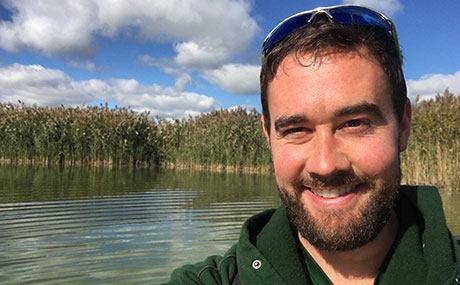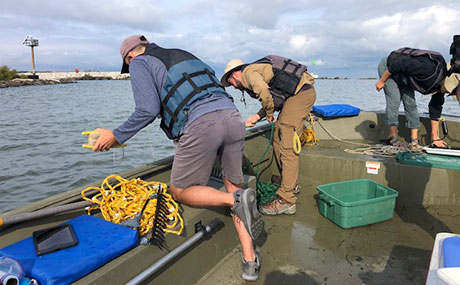 Mark
Warman,
a
2013
Baldwin
Wallace
sustainability
and
biology
graduate,
surprised
local
botanists
with
some
major
discoveries
in
Northeast
Ohio.
Mark
Warman,
a
2013
Baldwin
Wallace
sustainability
and
biology
graduate,
surprised
local
botanists
with
some
major
discoveries
in
Northeast
Ohio.
Warman serves as the aquatic invasive species project coordinator for the Cleveland Metroparks. He oversees efforts to identify and manage invasive plant species before they disrupt the local ecosystem. These initiatives save the city major maintenance costs down the line.
"Who wants to kayak through a mat of water weeds?" Warman explains.
Warman
is
regularly
dispatched
with
local
botanists
to
various
sites
in
Northeast
Ohio
in
search
of
invasive
plant
species.
It
was
during
a
routine
expedition
that
they
happened
upon
two
'lost'
plants
whose
natural
population
had
not
been
observed
in
over
50
years
in
the
state
of
Ohio.
 "We
tossed
garden
rake
heads
on
ropes
into
the
water
and
retrieved
[the]
plants,"
Warman
said.
"We
tossed
garden
rake
heads
on
ropes
into
the
water
and
retrieved
[the]
plants,"
Warman
said.
The first plant, Vasey's Pondweed, was found on an assignment in the Lorain County Metro Parks, and the second, Fineleaf Pondweed, was discovered right here in Lake Erie, north of Burke Lakefront Airport. Both plants were verified by the state botanist, confirming their exciting reappearance in Ohio.
"It's a plant that you don't see very often … So to come to Lorain County Metroparks and just see it really thriving and just a ton of it everywhere, it's a pretty neat thing," Warman said in a News Channel 5 story.
Warman's commitment to the study of both biology and sustainability during his tenure at BW has informed his career in robust ways. Warman is not only able to identify rare aquatic plant species but can also communicate the value of these finds in a way that shapes the conversation around preserving our local aquatic ecosystem.
Due to Ohio's tremendous water resources, we are witnessing the resurgence of these 'lost' plants.
Learning
about
the
health
of
local
rivers,
lakes
and
other
bodies
of
water
is
key;
these
resources
"should
be
protected
and
kept
free
of
invasive
species
so
we
can
continue
to
support
a
wide
variety
of
wildlife,"
Warman
says.
The
Cleveland
Metroparks
Aquatic
Invasive
Plant
Project
is
jointly
administered
by
the
Ohio
Department
of
Natural
Resources
Division
of
Wildlife
and
U.S.
Fish
and
Wildlife
Service
via
the
Great
Lakes
Restoration
Initiative
Program.